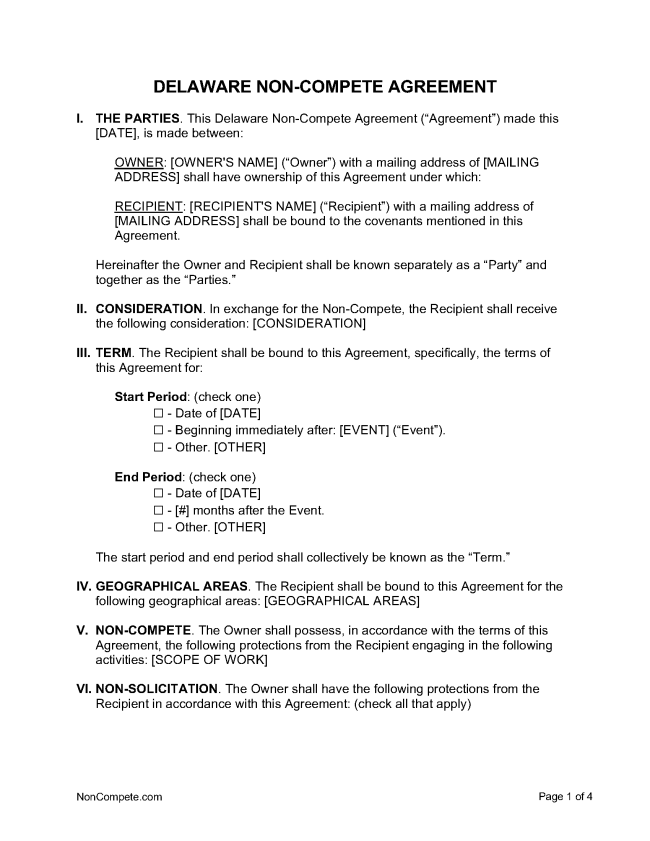A Delaware non-compete agreement is a limitation on the right of an employee to work in their field. Non-compete agreements may arise through the sale of a business or be included in employment contracts, although the latter are usually scrutinized more closely.
Delaware non-compete agreements can restrict the ability to work for some time or in a specific geographic area but must do so reasonably. Courts in the state also balance the harm done by enforcing an agreement with the damage done by not enforcing it.
Table of Contents |
Are Non-Competes Enforceable in Delaware?
Yes, a non-compete agreement is enforceable when the purpose of the agreement and its reasonable effect is to protect an employer from damages that an employee may cause after leaving the firm. (Capital Bakers, Inc. v. Leahy (1935))
Non-compete agreements are enforceable if the restraint it contains is reasonable in its geographic extent and the burden it imposes on the person prevented from participating in a particular business. (Tull v. Turek (1958))
Employment Agreement vs. Sale of Business
Non-compete agreements in employment contracts are subject to greater scrutiny than those associated with the sale of a business. (Faw, Casson Co. v. Cranston (1977))
Time and Geographic Reach
Non-compete agreements must be reasonably limited in both time and geographic reach. (McCann Surveyors, Inc. v. Evans (1987)).
Protectable Interests
Customer contacts, the goodwill of a business, and a firm’s relationships with its employees may all be validly protected in a non-compete agreement. (Knowles-Zeswitz Music, Inc. v. Cara (1969)).
A court is likelier to enforce a non-compete agreement where the restricted party has learned a trade secret or proprietary information. However, where the impact of enforcing the agreement is expected to be much more significant for the restricted party than the benefit to the party seeking enforcement, a court is less likely to enforce the agreement. (McCann Surveyors, Inc. v. Evans (1987)).
Prohibited Professions
Attorneys may not enter employment or partnership agreements that restrict their rights to practice after the relationship has terminated, except for provisions regarding retirement. They also may not settle cases in a way that restricts their right to practice. Delaware Rules of Professional Conduct, Rule 5.6.
Attorneys may, however, enter into agreements that limit their ability to enter specific markets or practice areas in connection with the sale of a law partnership. Delaware Rules of Professional Conduct, Rule 1.17.
Non-compete agreements involving physicians are generally unenforceable, but contract provisions requiring payment of the equivalent to the damage the other party suffers because of a physician’s continued practice may be upheld. Del. Code Ann. tit. 6, § 2707
Unlike doctors and attorneys, certified professional accountants do not face special requirements regarding non-compete agreements. (Faw, Casson Co. v. Cranston (1977)).
Terminating an Employee
Delaware law does not explicitly state whether terminating an employee makes a non-compete agreement unenforceable.
Burden of Proof
There is no clear law on which party has the burden of proof in non-compete agreements. Courts have suggested that the party seeking to have a non-compete agreement enforced must show that declining to enforce the agreement outweighs its harms. (McCann Surveyors, Inc. v. Evans (1987)).
Continued Employment (Consideration)
Continued employment is sufficient consideration for a valid non-compete agreement when an employee would lose the job if they declined to sign the agreement. (Research & Trading Corp. v. Powell (1983)).
Maximum Term
There are no maximum term non-compete agreements. However, the following time and geographic restrictions are reasonable:
- For an accountant, a period of five years, covering the DelMarVa peninsula: Faw, Casson Co. v. Cranston (1977)
- In the sale of a nursing home, preventing a competitor from opening another for ten (10) years within a county: Turek v. Tull (1958)
- In agreement with a musical instrument company limiting a former traveling salesperson, a two-year prohibition was reasonable, but a geographic bar of within 25 miles of a school district where the company had been active or within 100 miles of the city of Wilmington was unreasonable: Knowles-Zeswitz Music, Inc. v. Cara (1969)
Blue Penciling (allowed)
If an element of a non-compete agreement is unreasonable, the agreement will be enforced only to the extent that it is reasonable. For example, a court may enforce the agreement over a smaller area if a geographic restriction is too broad. (Knowles-Zeswitz Music, Inc. v. Cara (1969))
